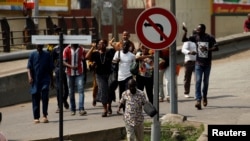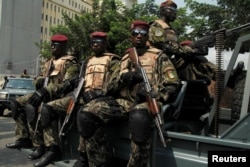Heavy gunfire erupted after dark on Wednesday in Ivory Coast's second port city, San Pedro, residents said, as two weeks of military uprisings that have tarnished the West African nation's image as a post-war success story showed no sign of letting up.
The shooting came just hours after the other main port in the commercial capital, Abidjan, reopened after paramilitary gendarmes firing in the air temporarily sealed off access forcing companies, including cocoa exporters, to close down.
President Alassane Ouattara, who is also facing a wave of public sector strikes, ordered his defence minister and military chiefs to hold urgent talks with members of the security forces about their grievances in a bid to quell the instability.
Ivory Coast has emerged from a 2002-2011 political crisis and civil war as one of the world's fastest-growing economies.
But the violence, which began with an army mutiny nearly two weeks ago, has exposed festering divisions within the military.
Ivory Coast's army was cobbled together after the civil war from rebel and loyalist factions. It was not immediately clear who was shooting in San Pedro, which is an export point for cocoa grown in the fertile west and had until Wednesday remained untouched by the waves of revolts that have swept through much of the rest of the country.
"Shooting started at the [bus] station where I am now," said taxi driver Hugues Kape, who said he had heard gunfire in two other neighborhoods as well. "There's heavy shooting and we are trying to get home now."
A second resident confirmed the gunfire.
President's Plea
Earlier in the day in Abidjan, gendarmes - a police force under the authority of the defense ministry - poured out of their base, sealing of entrances to the port and bringing activity there to a standstill.
The port reopened later in the day, the port authority said.
Separately, guards in Bouake, the second largest city, also fired their weapons in front of the main prison to try to pressure the government into paying them more money, a local member of parliament said.
After a cabinet meeting on Wednesday, government spokesman Bruno Kone said: "The President of the Republic ... asks all soldiers, gendarmes, police, customs officers, forestry service agents and prison guards to facilitate the return of calm."
Defense Minister Alain-Richard Donwahi said the government was already in contact with those involved.
"We are going to regain control of this army so it will truly be at the service of the nation," he told reporters.
Soldiers - mainly ex-rebels - stormed out of their barracks and seized Bouake on Jan. 6, and the mutiny quickly spread, forcing the government to capitulate to the mutineers' demands.
The government started making promised bonus payments to disgruntled soldiers this week in line with an agreement to end the mutiny, although the payments have angered rival factions and triggered copycat demands.
Soldiers in other segments of the military revolted in the capital, Yamoussoukro, on Tuesday, leading to clashes in which at least two soldiers were killed.






